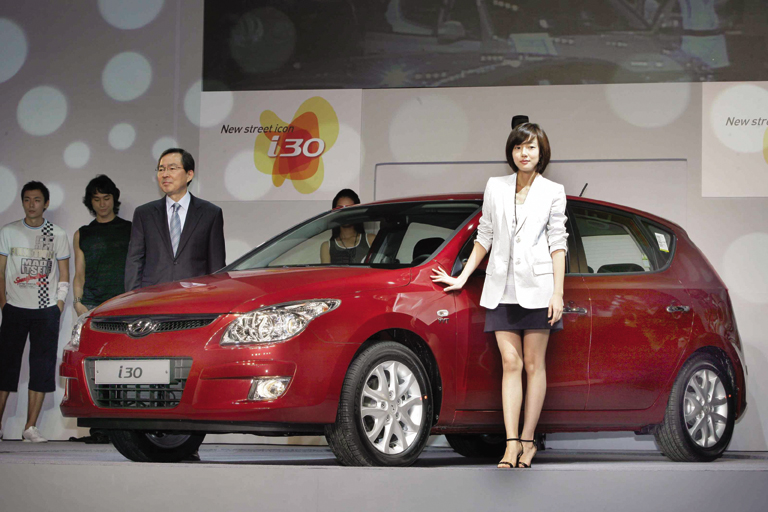Hyundai Motor's Romp in Europe
Carmaker sells engines and introduces i30 minisedan to expand its market share in Europe
 Hyundai Motor will launch the sale of its i30 hatchback mini-sedan in the domestic market to compete with imported cars of the same class such as Volkswagen's Golf and Peugeot 307, and other foreign car models priced in the range of 20 million won to 30 million won, the company said recently.
Hyundai Motor will launch the sale of its i30 hatchback mini-sedan in the domestic market to compete with imported cars of the same class such as Volkswagen's Golf and Peugeot 307, and other foreign car models priced in the range of 20 million won to 30 million won, the company said recently.
Hyundai Motor officials are confident that their new mini-sedan will out perform its foreign rivals in sales because it saves more fuel than those cars.
The company made a debut of the new car at the Seoul Olympic Park, which the company said was designed to target the European car market. The car has a design that suits European car buyers and a dynamic run from its 1,600 cc gamma gasoline engine with the maximum 121 horse power. It can run 13.8 km per liter of gasoline, which is better than its rivals Volkswagen Golf and Peugeot 307, company officials said.
The new sedan has airbags in front seats and designed to ease the cushion curing crashes.
 It was introduced at Paris Motor Show last year with the model name of Anej and developed at the cost of 195.9 billion won in 21 months.
It was introduced at Paris Motor Show last year with the model name of Anej and developed at the cost of 195.9 billion won in 21 months.
Hyundai Motor projects it would be able sell about 6,000 130s in the country and 72,000 around the world including Europe from next month when a worldwide marketing for the new sedan kicks off. The company said its sales of the new i30 can reach as high as 240,000 annually from 2008. The new minisedan comes in five different models priced at from 14.10 million won to 18.55 million won per car including value-added taxes.
Choi Jae-kook, president of Hyundai Motor, said the new car and its sister car C'eed would not have too much trouble in the European car market, which sells from 4 to 5 million mini sedans annually.
In the meantime, Hyundai Motor will become the first Korean automaker to export its engines to foreign countries, in this case, Germany. According to the car maker's announcement on July 9, the Korean auto maker will soon sign an official agreement with Daimler-Benz to supply three types of its car engines, 2.OL gasoline engine and 1.6 and 2.OL diesel engines from this year.
The company expects to ship from 20,000 to 30,000 engines this year and 100,000 engines next year under the agreement.
Hyundai Motor officials said they got an offer from the German car maker if they can sell car engines to install them on its cars last year. The company studied the proposal and came to the conclusion it can and the German automaker also carried out an experiment if Hyundai Motor engines can be installed on its cars.
The 2.OL gasoline engines power Sonatas and Daimler-Benz wants to import half-finished engines and boost their power by installing compressors. The two diesel engines can satisfy the Euro IV exhaustion gas emission standard and environment-friendly with low-noise levels.
The 1.6 OL diesel engine which powers Avantes has 117 horse power and 2.OL diesel engine which powers Santa Fes and Sonatas has 151 horse power, nothing short of similar engines produced in Europe. Benz will install these engines on its Benz B and C class cars which are currently powered by 1.8 and 2.OL engines the company developed in the middle of '90s.
Hyundai Motor got engaged in developing its own car engines in 2002 when it set up 'Gemma'Co. jointly with Daimler-Chrysler and Mitsubishi Motors. In the joint effort, Hyundai Motor earned $57 million from the joint-venture for designing engines and development of 1.8, 2.0, and 2.5L gasoline engines. The automaker launched the development of a diesel engine with low noises and environment-friendly by investing 300 billion won from 2001. With the government allowing the sale of diesel-powered cars, the company doubled the production capacity of its engine plant and to 500,000 to 600,000 engines per year.
The sale of diesel-powered cars remained at 5 to 10 percent of the sale of gasoline-driven cars. The automaker has been groping with the over-capacity in its engine production and it got the offer from Daimler-Benz.
Benz focused on the development of cars investing some 10 trillion won since its take over of Chrysler, the third largest automaker in the world in 1999. It parted ways with Chrysler in May. Since Chrysler didn't have the facility for engine production, Benz focused on engine production, more than 2.4L in capacities, not smaller engines. The company has not produced its own engines for smaller cars in the past 7 years. Benz apparently thought highly of Hyundai Motor's engines for small cars and decided to install them in its small cars. nw
The i30, a new passenger car introduced by Hyundai Motor at home and in Europe
(left photo) Hyundai-Kia Automotive Group Chairman Chung Mong-koo
3Fl, 292-47, Shindang 6-dong, Chung-gu, Seoul, Korea 100-456
Tel : 82-2-2235-6114 / Fax : 82-2-2235-0799